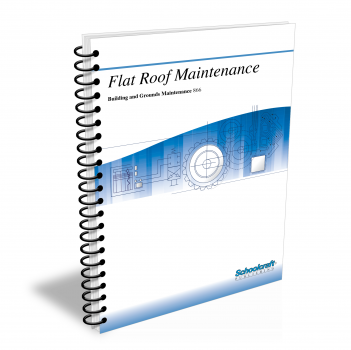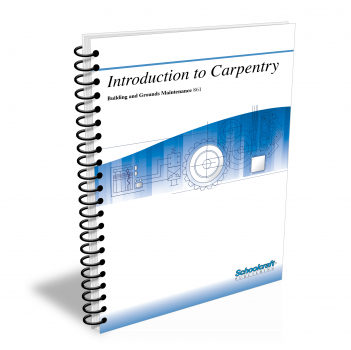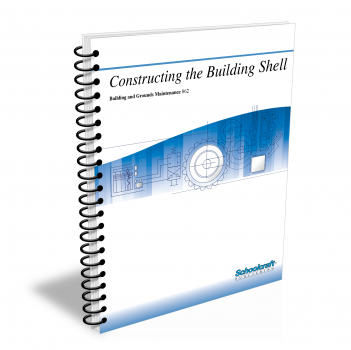Flat Roof Maintenance

Course Number: 866
The Flat Roof Maintenance textbook introduces roofing, including flat roof systems and various types of decks. It examines insulating and water-proofing materials, and techniques of application. Next, it discusses roofing damage, how to repair roofs, and how to make a proper roof inspection. It also explains types of preventive maintenance, how to plan preventive maintenance, and how to select the proper materials to use.
Does your curriculum require additional topics not included in this textbook? Build a customized version of the Flat Roof Maintenance textbook below.
Recommended Contact Hours – 12
Preview a Chapter
Available Supporting Material
- Table of Contents
- Exam Copies
- Suggested Titles
Table of Contents
Chapter 1: Introduction to Flat Roof Systems
Topics: Structural deck; Wood, concrete, and steel decks; Vapor barrier; Thermal insulation; Waterproofing materials; Aggregate; Flood coats; Walkways
Learning Objectives:
- Name and define the four basic components that make up a flat roof system.
- Explain the differences among a pre-stressed concrete deck, a pre-cast deck, and a reinforced deck.
- Explain the functions of a vapor barrier.
- Tell why thermal insulation is applied above deck in some applications, and below deck in others.
- List three benefits of coating a flat roof with aggregate or crushed slag.
Chapter 2: Roof-Related Components
Topics: Base and counter flashings; Flashings for vents; Irregular roof penetrations; Expansion joints; Drainage systems; Parapet walls; Scuppers
Learning Objectives:
- Explain how a base flashing and a counter flashing work together to protect a roof.
- Tell how and why a hot vent is usually flashed differently from a cold vent.
- Name three roof conditions that make it necessary to install expansion joints.
- Describe how the components of a flat roof drainage system work together
- Tell how to keep moisture out of parapet walls.
Chapter 3: Causes of Common Roof Problems
Topics: Roofing membrane failure; Bare spots; Blisters; Punctures; Splits; Dirt and debris; Alligatoring; Installation problems; Ponding; Damp insulation
Learning Objectives:
- Describe the causes of blisters, bare spots, and punctures.
- Explain how dirt and debris create maintenance problems on flat roofs.
- Name the most common reasons for vent flashing failure.
- List the steps to take to prevent water from ponding on a flat roof.
- Tell how to set heavy equipment on a flat roof without damaging the membrane.
Chapter 4: Roof Inspection
Topics: Selecting an inspector; Making the inspection; Hidden trouble; Moisture in the roof
Learning Objectives:
- Tell what a roofing bond or guarantee usually covers and doesn't cover.
- List the materials and information that a roof inspector should have for his guidance.
- Describe two ways of telling whether the roofing bitumen is asphalt or coal tar.
- Explain how water can seep through roof penetrations, pitch pockets, and parapet walls.
- Describe a simple means for measuring the moisture content in a roof system.
Chapter 5: Preventive Maintenance and Repair
Topics: Maintaining the roofing membrane; Flashings, pitch pockets, drains, gutters, and parapet walls; Emergency repairs; Snow and ice; Safety
Learning Objectives:
- Name the basic materials that should be stocked for making roof repairs.
- Tell how to repair a split membrane if sealing tape isn't available.
- Describe how to repair a hole in a base flashing.
- Explain how moisture can cause a parapet wall to crack and crumble.
- Explain how to channel a roof leak to a floor drain.
- Describe how to use tools, ladders, and hoists safely when repairing roofs.
Chapter 6: Single-Ply Roofing
Topics: Thermoplastic polymers; Elastomers; Modified bitumen; Roof-laying methods; Installation and maintenance; Inspection checklist
Learning Objectives:
- Name and describe the three types of single-ply roofing materials.
- Detail the roof-laying methods used with each of these types.
- Identify actions that would void a typical roof warranty and explain why it is important to keep the warranty in effect.
- Explain the six key points that should be checked in the inspection of a single-ply roof.
Request Exam Copies
Exam Copies
Ready to see a copy of our textbooks? After selecting which textbooks you’d like to review for your course, you can submit your request by either logging in or creating an account so we know where to ship your exam copies. A representative from Schoolcraft will contact you to confirm and finish processing your request.
Exam copies are always free and yours to keep.
Selected Exam Copies
none selected
* Maximum of five copies can be ordered


